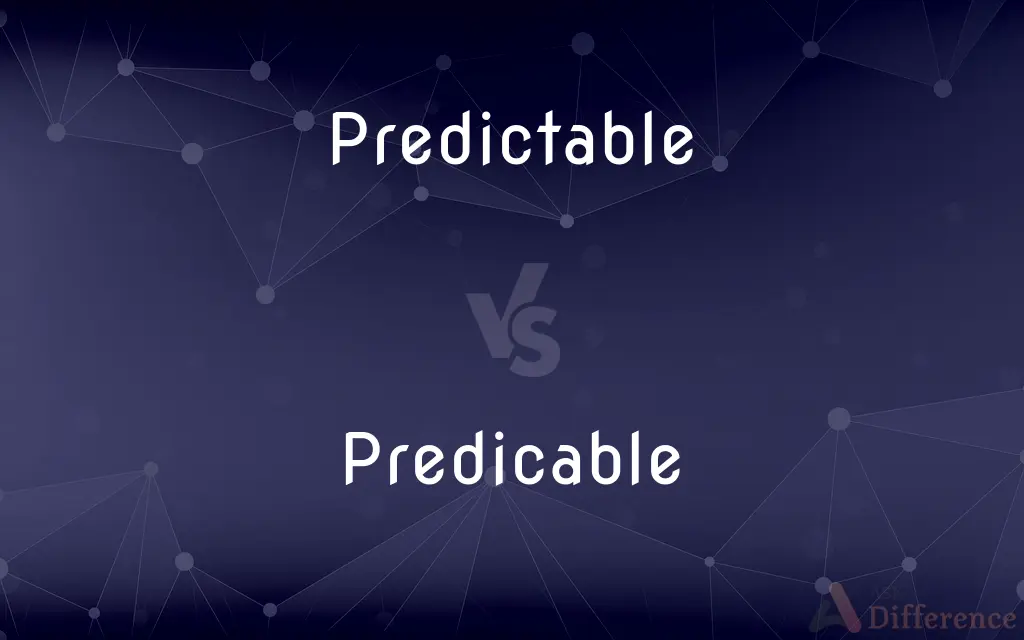Predictable vs. Predicable — What's the Difference?
By Tayyaba Rehman & Maham Liaqat — Updated on April 23, 2024
Predictable refers to something that can be foreseen or expected, while predicable is a term in logic referring to a property or attribute that can be affirmed of a subject.

Difference Between Predictable and Predicable
Table of Contents
ADVERTISEMENT
Key Differences
Predictable refers to events or outcomes that can be anticipated in advance based on prior knowledge, patterns, or trends, such as the plot of a typical romantic movie. On the other hand, predicable involves philosophical and logical contexts, particularly as attributes that can be asserted about subjects, like 'red' can be predicable of an apple.
In everyday language, predictable is often used to describe situations or behaviors that lack surprise, like a predictable ending to a story, whereas predicable is a specialized term used primarily in philosophical and logical discussions to denote qualities or properties that can be attributed to various subjects.
The concept of predictable is integral to fields like meteorology, where forecasts are based on scientific data and patterns, while predicable finds its relevance in formal debates and writings, where precise language is crucial for defining and discussing concepts.
While predictable can have a somewhat negative connotation when referring to things that are boring or uninspiring due to their lack of novelty, predicable remains neutral and technical, reflecting its use in academic and logical discourse.
Understanding predictable helps in planning and risk management, as it involves anticipating future events, whereas understanding predicable is essential for engaging in detailed philosophical or logical analysis, focusing on the attributes of subjects.
ADVERTISEMENT
Comparison Chart
Definition
Capable of being foreseen or expected
A property that can be affirmed of a subject
Usage Context
Common in everyday language
Primarily used in philosophy and logic
Connotation
Can be negative (boring, obvious)
Neutral, technical
Relevance in Fields
Meteorology, psychology, finance
Philosophy, logic
Example of Usage
Predictable movie plot
'Red' is predicable of an apple
Compare with Definitions
Predictable
Capable of being known before happening.
The outcome of the match was predictable after the red card.
Predicable
Used in logic to express properties.
Being spherical is predicable of a basketball.
Predictable
Easily forecasted.
The plot twist in the novel was predictable.
Predicable
Affirmable as a characteristic of a subject.
In logic, 'mammal' is predicable of a dog.
Predictable
Expected based on previous patterns.
His reaction was predictable.
Predicable
Relates to philosophical attributes.
The concept of motion is predicable of physical objects.
Predictable
Common in outcomes or responses.
The response to the policy change was predictable.
Predicable
Applicable in discussions of ontology.
'Transparent' is predicable of glass.
Predictable
Lacking in novelty or surprise.
The ending of the film was predictable.
Predicable
Concerned with essential qualities.
Being edible is predicable of apples.
Predictable
To state, tell about, or make known in advance, especially on the basis of special knowledge
Predicted an active hurricane season because of warmer ocean-surface temperatures.
Predicable
Predicable (Lat. praedicabilis, that which may be stated or affirmed, sometimes called quinque voces or five words) is, in scholastic logic, a term applied to a classification of the possible relations in which a predicate may stand to its subject.
Predictable
To foretell something.
Predicable
Capable of being stated or predicated
A predicable conclusion.
Predictable
Able to be predicted.
A predictable mathematical pattern
A boring film with a predictable ending
Predicable
Something, such as a general quality or attribute, that can be predicated.
Predictable
(uncommon) A predictable thing.
Predicable
One of the general attributes of a subject or class. In scholastic thought, the attributes are genus, species, property, differentia, and accident; in Aristotelian thought, they are definition, genus, proprium, and accident.
Predictable
That may be predicted.
Predicable
Capable of being predicated or affirmed of something; affirmable; attributable.
Predictable
Possible to foretell
Predicable
That may be used in the predicate of a sentence, especially following a form of the verb "to be".
Predicable
Anything affirmable of another; especially, a general attribute or notion as affirmable of, or applicable to, many individuals.
Predicable
(logic) One of the five most general relations of attributes involved in logical arrangements, namely, genus, species, difference, property, and accident.
Predicable
Capable of being predicated or affirmed of something; affirmable; attributable.
Predicable
Anything affirmable of another; especially, a general attribute or notion as affirmable of, or applicable to, many individuals.
Predicable
One of the five most general relations of attributes involved in logical arrangements, namely, genus, species, difference, property, and accident.
Common Curiosities
How is predicable used in philosophy?
Predicable is used to describe a property or attribute that can be affirmed or applied to a subject in philosophical or logical arguments.
In what contexts is predicable most relevant?
Predicable is primarily relevant in formal academic contexts, especially in discussions involving philosophy and logic.
What does predictable mean in a general sense?
Predictable refers to something that can be anticipated or expected based on prior knowledge or patterns.
Can predictable have a negative implication?
Yes, predictable can imply a lack of novelty or excitement, often leading to boredom.
What is an example of a predictable situation?
A predictable situation could be the plot of a cliché romantic comedy where the ending is obvious from the start.
What makes something predicable in logic?
In logic, a predicable is an attribute or quality that logically can be said to belong to a category or class of things.
Is predictability always undesirable?
Not necessarily; predictability can be beneficial in contexts like safety and planning, where knowing outcomes in advance is crucial.
How can understanding predicable concepts benefit someone?
Understanding predicable concepts can enhance one’s ability to engage in precise and thoughtful philosophical or logical discussions.
How does predictable differ from expected?
Predictable and expected are similar, but predictable often emphasizes the ease or certainty of anticipation based on existing patterns.
What are typical examples of predicable attributes?
Typical examples include attributes like color, shape, and size.
Share Your Discovery

Previous Comparison
Mad vs. Upset
Next Comparison
Faucet vs. SpigotAuthor Spotlight
Written by
Tayyaba RehmanTayyaba Rehman is a distinguished writer, currently serving as a primary contributor to askdifference.com. As a researcher in semantics and etymology, Tayyaba's passion for the complexity of languages and their distinctions has found a perfect home on the platform. Tayyaba delves into the intricacies of language, distinguishing between commonly confused words and phrases, thereby providing clarity for readers worldwide.
Co-written by
Maham Liaqat













































